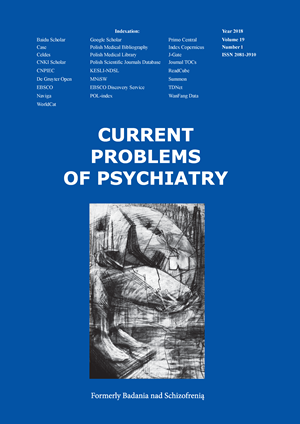The role of long term care centers in the Polish system of mental health care
DOI:
https://doi.org/10.1515/cpp-2018-0004Keywords:
mental health care center, system of mental health care, community care systemAbstract
Objective: The aim of this work is to review the role of mental health care center and treatment center specialized in psychiatry in the Polish system of mental health care as a whole.
Review: For many years in Poland, the process of transformation of psychiatric care model from the institutional (inpatient setting, most expensive) to community care model (personalized, much cheaper), has been taking place. The effective - coordinated system of community care should significantly improve cooperation in the treatment, while the community forms of health care should ensure full availability, complexity, and continuity of care provision. In many cases, the community support is inadequate and cannot provide patient with care at his home environment. For mentally ill, there may be a need for the use of the long term health care centers specialized in psychiatry.
Conclusions: A long term mental health care center specialised in mental health plays an important role in long-term care for the mentally ill. As far as a mental health service user’s perspective is concerned, the continuity of care and treatment in the long term health care center (as a health care unit) appears to be more useful and satisfying compared to a residential home for people with chronic mental illnesses. There is a need for broad discussion on the special place of the long term health care center specialized in psychiatry in the present Polish system of mental health care and on the improving of care pathways between inpatient-, day careand, community care package.
References
1. Mazur I, Karnieja P, Jończyk J. Zdrowie psychiczne. Organizacja - Zarządzanie - Standardy. Wrocław: 2015.
2. A. Denys. Zagrożenia Zdrowia Publicznego. Wybrane zagadnienia, ABC Wolters Kluwer, Warszawa: 2014.
3. Kiejna A, Adamowski T, Piotrowski P, Moskalewicz J, Wojtyniak B, Świątkiewicz G et al. Epidemiology of mental disorders and access to mental health care. EZOP – Poland” – research methodology Psychiatria Pol. 2015; 49(1):5–13.
4. Załuska M. The community-based psychiatric care model and changes in the health system structure in recent years in Poland. Postępy psychiatrii i Neurologii 2006;15(4):277-285.
5. Rozporządzenie Rady Ministrów z dnia 28 grudnia 2010 r. w sprawie Narodowego Programu Ochrony Zdrowia Psychicznego; Dz.U. 2011 nr 24 poz. 128.
6. Szafrański T. Ochrona zdrowia psychicznego we współczesnym świecie. W: Ochrona zdrowia psychicznego w Polsce: wyzwania, plany, bariery, dobre praktyki. Raport RPO. Warszawa: 2014.
7. Straathdee G, Thornicroft G. Community psychiatry and service evaluation. W: Murray R, Hill P, McGuffin P. The Essentials of Postgraduate Psychiatry, 3rd Edition. Cambridge University Press: 1997.
8. Rozporządzenie Rady Ministrów z dnia 8 lutego 2017 r. w sprawie Narodowego Programu Ochrony Zdrowia Psychicznego na lata 2017–2022; Dz.U. 2017 poz. 458.
9. Langiewicz W. System lecznictwa psychiatrycznego. W: Ochrona zdrowia psychicznego w Polsce: wyzwania, plany, bariery, dobre praktyki. Raport RPO. Warszawa: 2014.
10. Ustawa z dnia 19 sierpnia 1994r. o ochronie zdrowia psychicznego; Dz.U. 2016 poz.546.
11. Rocznik Statystyczny Rzeczypospolitej Polskiej 2015.
12. Rozporządzenie Ministra Zdrowia z dnia 6 listopada 2013 r. w sprawie świadczeń gwarantowanych z zakresu opieki psychiatrycznej i leczenia uzależnień; Dz.U. 2013 poz. 1386.
13. Łoza B, Gryglewicz J. Raport Narodowy Program Ochrony Zdrowia Psychicznego 2016-2020 – Rekomendacje. Warszawa: 2015.
14. Ustawa z dnia 12 marca 2004 r. o pomocy społecznej; Dz.U. 2016 poz.930.
15. Rozporządzenia Ministra Polityki Społecznej z dnia 22 września 2005 r. w sprawie specjalistycznych usług opiekuńczych; Dz.U. 2005 nr 189 poz. 1598.
16. Ustawa z dnia 15 kwietnia 2011 r. o działalności leczniczej; Dz.U. 2016 poz.1638.
17. Zarządzenie Nr 79/2013/DSOZ Prezesa Narodowego Funduszu Zdrowia z dnia 13 grudnia 2013 r. w sprawie określenia warunków zawierania i realizacji umów w rodzaju opieka psychiatryczna i leczenie uzależnień.; Dz.U. z 2008 r. nr 164, poz.1027.
18. Rozporządzenie Ministra Zdrowia z dnia 25 czerwca 2012 r. w sprawie kierowania do zakładów opiekuńczo-leczniczych i pielęgnacyjno-opiekuńczych; Dz.U.2012 poz. 731.
19. Ustawa z dnia 24 stycznia 1991 r. o kombatantach oraz niektórych osobach będących ofiarami represji wojennych i okresu powojennego; Dz.U. 2016 poz. 1255.
20. Ustawa z dnia 27 sierpnia 2004 r. o świadczeniach opieki zdrowotnej finansowanych ze środków publicznych; Dz.U. 2016 poz. 1793.
21. Rozporządzenie Ministra Zdrowia z dnia 28 grudnia 2012 r. w sprawie sposobu ustalania minimalnych norm zatrudnienia pielęgniarek i położnych w podmiotach leczniczych niebędących przedsiębiorcami; Dz.U. z 2012 poz. 1545.
22. Rozporządzenie Ministra Pracy i Polityki Społecznej z dnia 23 sierpnia 2012 r. w sprawie domów pomocy społecznej; Dz.U. 2012 poz. 964.
23. Jakubik A. Zaburzenia osobowości. PZWL, Warszawa: 1997.
Downloads
Published
Issue
Section
License
Copyright (c) 2018 Authors

This work is licensed under a Creative Commons Attribution-NonCommercial-NoDerivatives 3.0 Unported License.


